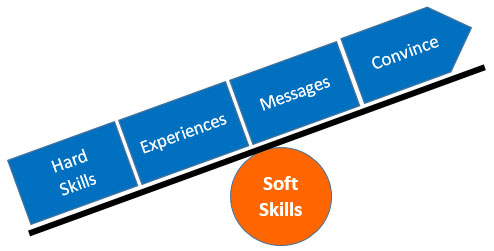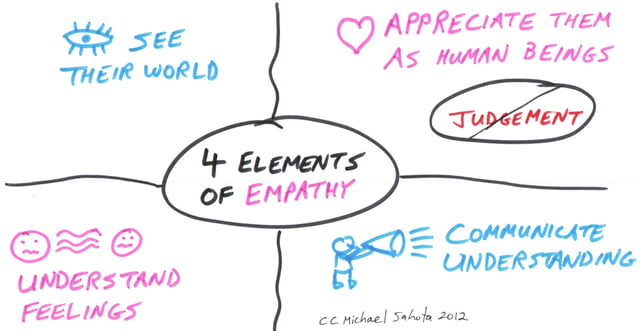In consultancy we often talk about the difference between having an educated opinion on the one hand and getting your opinion accepted on the other. In short, it’s the difference between ‘being right’ and others saying that you are and taking positive action because of it. When you know how to convince the person on the other side of the table of your opinion, you’ll find that it will positively affect the deployment of your hard skills.
At AE, Vincent Guelinckx is one of the strongest proponents of the development of a wide range of soft skills, not in the least because these skills form the basis of real, value-based consultancy.
Why are soft skills so important for a consultant today?
To me, soft skills are considered a key success factor in your career and (professional) relationships. Now more than ever.
Soft skills are extremely important in all kinds of daily interactions: teaching, consulting, selling, negotiating, communication, presenting, etc. All these interactions have one thing in common: to successfully get a message from a sender to a receiver.
So, soft skills can truly be seen as an enabler of the ‘message’ you want to bring across, a means to unleash the value and power of your knowledge, experiences or message. And they’re necessary, because experience or knowledge that remains hidden or unaccepted has little value.
VALUE OF AN ADVICE = INTRINSIC VALUE X LEVEL OF ACCEPTANCE
If the level of acceptance is less than 1, the value of your advice is suboptimal…so if you want to deliver valuable advice as a consultant, work both on the value itself and the soft skills as the key enabler. If you ignore the acceptance part, your client won’t get access to the full potential of your intrinsic value.

What soft skills do you need exactly to convince or persuade people?
I think the following three factors play a key part:
- Empathy
- Perspective-taking
- Focus on value (outcome)
If you combine these three elements, you can build up a genuine relationship built on trust, which is the best basis for co-creating value.
Why is empathy so important?
Empathy is the ability to understand and appreciate another person's situation or feelings. What is more, it’s also the ability to genuinely show that you understand and appreciate someone else’s situation or feelings. The other person has to experience your sincere comprehension of his/her feelings.
Empathy is a clear precondition for a fruitful and heartfelt conversation. But it only goes so far. Sharing and understanding emotions doesn’t get the job done.

How do you ensure that, as a consultant, you always look at things from the proper perspective?
In my daily conversations with consultants and clients, I feel that many people leave the table without an agreement or a jointly plan, quoting that it didn’t work out despite empathy on both sides.
This shows that not only do you have to understand and appreciate another’s opinion, you have to step in his shoes: you have to understand the why behind their opinion and feelings. Once you’ve taken this step, you have all the information you need to convince the other party, provided that you have good arguments of course.
Why does a consultant need to keep focusing on value throughout the conversation?
Because no matter how well you apply all principles and tricks, there has to be value in your proposed message.
Clearly, if you are a person with very good persuasion skills, you can convince people of things that have no value. That is what happens when you are tricked into something, which is something that should be avoided at all costs.
Leaving out the value part will harm your personal reliability, as well as your ability to persuade in the long run. Clearly this is not what you want when building a relationship based on trust.
Remember: trust is the strongest foundation there is for long-term relationships in which there’s mutual respect.
An example
To illustrate where our three key factors come in, we’ll consider the situation of one person trying to convince another of his/her point of view: a developer trying to convince his/her project manager of a new functionality.
Empathy
In our example the developer has to show the project manager that he understands and sincerely appreciates the latter’s objectives to the new functionality. These objectives typically are cost overrun, extra risks, etc.
Perspective-taking
In our example, the project manager is not convinced of the new functionality. The main reason is that the project is already over budget and the project manager doesn’t want to explain these extra costs and risks to his/her project sponsor. If the developer steps into the shoes of his/her project manager, he/she can help build up the arguments necessary to convince the sponsor.
Overall we can distinguish 4 levels:
- The developer must understand the elements of extra costs and risks;
- The developer must be able to explain that this new functionality will also lower other costs and reduce some other risks (value);
- He must understand the fact that the project manager must be able to sell this change to his project sponsor;
- In the end he must understand the goals of the project sponsor to be able to help the project manager in his argumentation.
In other words, if you understand the goals of your boss’s boss, and if you help your boss in convincing his/hers, you’re probably doing a hell of a “perspective-taking” job.
Focus on value
In our example, the developer has to bring value to the table. His/her new proposed functionality must be something that is required and valuable, that makes other functionalities obsolete and that doesn’t increase overall costs and risks.
Want to know more about our focus on soft skills? Contact us.





